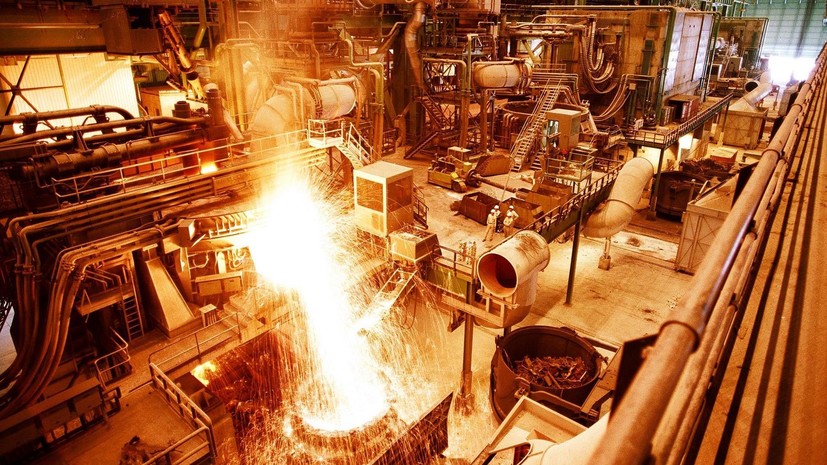The United States imposed sanctions against 17 metallurgical and mining Iranian companies. This was stated by United States Secretary of Finance Stephen Mnuchin.
In addition, eight senior Iranian officials were on the list.
“Our measures are directed against senior Iranian officials who participated in or were involved in ballistic missile strikes on Tuesday,” the US Treasury quoted Mnuchin.
“These sanctions will continue until the regime stops financing international terrorism and does not commit itself to abandon the idea of possessing nuclear weapons,” the head of the US Treasury said.
As explained in the department, the enterprises of the metallurgical sector allow Iran to earn "billions of dollars annually."
In total, we are talking about 17 Iranian metallurgical enterprises. Among them, for example, the Mobarakeh Steel Company is the largest steel producer in the Middle East and North Africa and one of the largest industrial complexes in Iran.
Sanctions are also being introduced against the Iranian aluminum company, which produces the most aluminum in the country. Both companies are actively trading in international markets.
Sanctions have also been imposed against Iran’s foreign partners. Chinese Pamchel Trading Beiking Co. Ltd., Seychelles Power Anchor Limited and Chinese Hongyuan Marine Co. Ltd., which owns the ship Hong Xun - according to the Ministry of Finance, it transported Iranian steel.
The property and assets of these enterprises in the United States will be frozen. Any transactions with them are prohibited for American citizens and companies.
At the same time, the United States reserves the right to impose sanctions on other foreign financial institutions that participate in transactions involving Iranian officials subject to sanctions.
“It should be added that persons conducting business with those who have been included in the sanctions list today may themselves be subject to sanctions. Moreover, any foreign financial institution that is consciously engaged in commercial activities on a substantial scale on behalf of or on behalf of persons who have been included in the sanctions list today may be subject to American sanctions regarding correspondent or cross-account accounts, ”the Finance Ministry emphasized.
In addition, US President Donald Trump signed a special decree that gives the head of the Ministry of Finance the right to impose additional sanctions.
“In particular, a presidential decree authorizes the Minister of Finance, in consultation with the Secretary of State, to impose sanctions on persons engaged in commercial activities in other sectors of the Iranian economy, including the construction, mining, processing and textile industries,” the website of the Ministry of Finance said.
According to US Secretary of State Mike Pompeo, during the presidency of Trump, Iran's income allegedly fell by 80%.
However, a corresponding member of the Academy of Military Sciences, political scientist Sergei Sudakov, believes that such sanctions are not ways to force Iran to abandon independent politics.
“Now there are no economic enforcement mechanisms that would force the US to bring Iran to its knees,” he told RT. “Today’s statement by the Ministry of Finance and Trump’s statement that it will be brutal sanctions against Iran, they hide an important aspect: economic interaction between the US and Iran is absent, Iran and the EU are practically also minimized.”
Sudakov noted that Iran’s main trading partner is China, in connection with which Washington will have to exert pressure on Beijing to really influence Tehran’s policies.
“For the time being, America cannot put pressure on China, because the Chinese economy is powerful enough, and the interpenetration of the US and Chinese economies is too significant,” the analyst explained.
“They will not change the situation radically”
Sanctions were imposed after rocket attacks on US military bases in Iraq. The attack became Iran’s revenge for the US assassination of General IRGC Kassem Suleimani in Iraq.
On the night of January 3, Americans launched a missile attack on the outskirts of Baghdad, killing a high-ranking Iranian general, as well as the head of the Iraqi Shiite militia Abu Mahdi al-Muhandis and about ten accompanying people. Soleimani was popular in Iran and his assassination caused thousands of protests against US actions. Tehran promised to avenge the death of the general.
On the night of January 7-8, Iran launched several attacks on US military bases in Iraq as part of Operation Martyr Suleimani. General IRGC Amir Ali Hajizadeh stated that 13 missiles were fired. At the same time, according to him, the task was not to kill the US military, but to damage US equipment. In Washington, they said that no one was injured in the attack. Trump promised to introduce new sanctions.
“As we continue to evaluate options for responding to Iranian aggression, the United States will immediately impose additional severe economic sanctions against the Iranian regime. These powerful sanctions will remain in effect until Iran changes its behavior, ”said the American president.
Trump is forced to continue the sanctions policy, but it will not be able to fundamentally change the current situation, says Grigory Yarygin, associate professor at the Department of American Studies at St. Petersburg State University.
“Sanctions that are individual, they do not carry much meaning, except for the emotional burden. Sanctions against less than two dozen companies in the same industry will not radically change the situation. Donald Trump obviously needs to answer. He promised, and he now offered. A lot of these sanctions accumulate quite a lot and if the situation is excluded, then additional sanctions, like this, step by step, can have a more tangible effect on Iran. But for now, this is an exchange of demonstrative steps, ”he said in an interview with RT.

